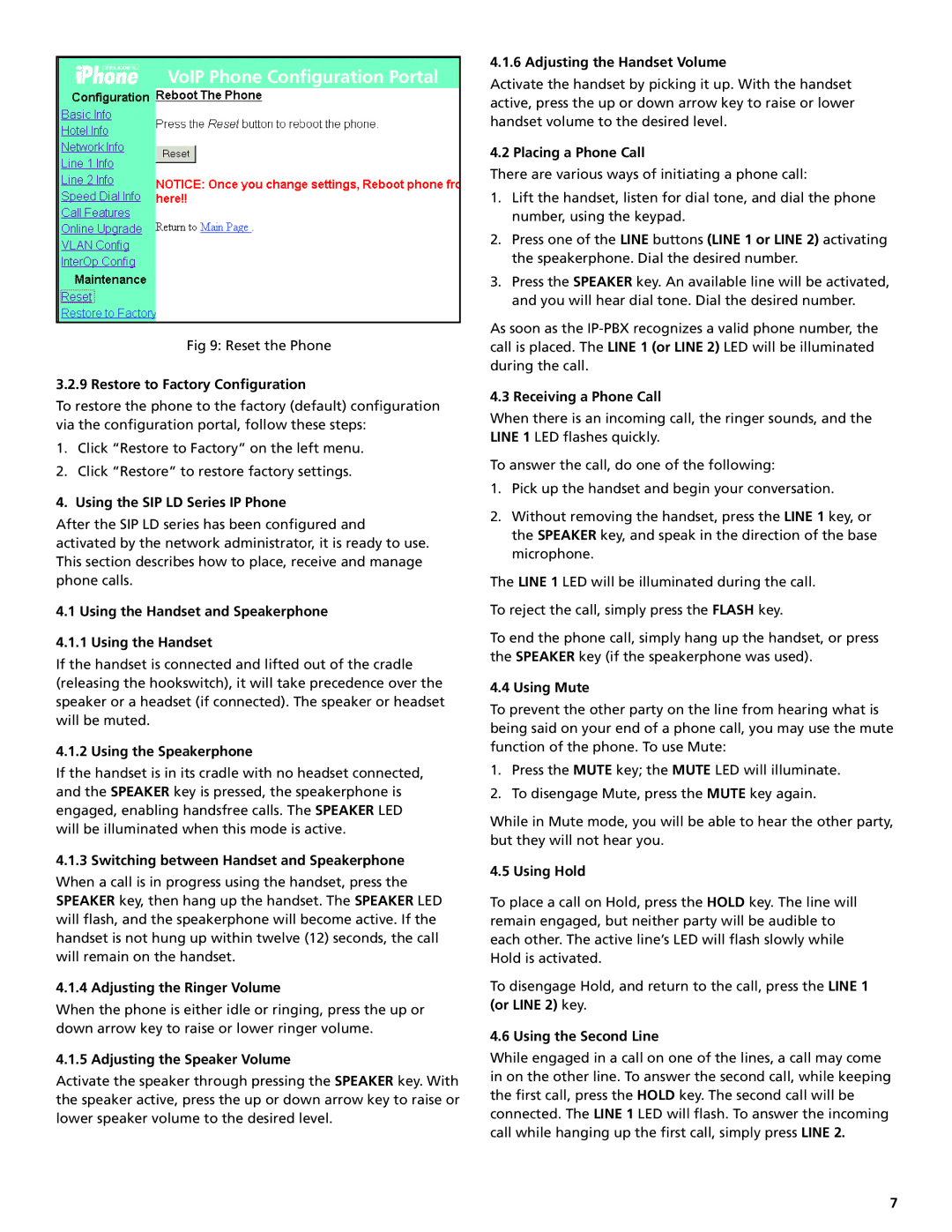
Fig 9: Reset the Phone
3.2.9 Restore to Factory Configuration
To restore the phone to the factory (default) configuration via the configuration portal, follow these steps:
1.Click “Restore to Factory” on the left menu.
2.Click “Restore” to restore factory settings.
4. Using the SIP LD Series IP Phone
After the SIP LD series has been configured and activated by the network administrator, it is ready to use. This section describes how to place, receive and manage phone calls.
4.1 Using the Handset and Speakerphone
4.1.1 Using the Handset
If the handset is connected and lifted out of the cradle (releasing the hookswitch), it will take precedence over the speaker or a headset (if connected). The speaker or headset will be muted.
4.1.2 Using the Speakerphone
If the handset is in its cradle with no headset connected, and the SPEAKER key is pressed, the speakerphone is engaged, enabling handsfree calls. The SPEAKER LED will be illuminated when this mode is active.
4.1.3 Switching between Handset and Speakerphone
When a call is in progress using the handset, press the SPEAKER key, then hang up the handset. The SPEAKER LED will flash, and the speakerphone will become active. If the handset is not hung up within twelve (12) seconds, the call will remain on the handset.
4.1.4 Adjusting the Ringer Volume
When the phone is either idle or ringing, press the up or down arrow key to raise or lower ringer volume.
4.1.5 Adjusting the Speaker Volume
Activate the speaker through pressing the SPEAKER key. With the speaker active, press the up or down arrow key to raise or lower speaker volume to the desired level.
4.1.6 Adjusting the Handset Volume
Activate the handset by picking it up. With the handset active, press the up or down arrow key to raise or lower handset volume to the desired level.
4.2 Placing a Phone Call
There are various ways of initiating a phone call:
1.Lift the handset, listen for dial tone, and dial the phone number, using the keypad.
2.Press one of the LINE buttons (LINE 1 or LINE 2) activating the speakerphone. Dial the desired number.
3.Press the SPEAKER key. An available line will be activated, and you will hear dial tone. Dial the desired number.
As soon as the
4.3 Receiving a Phone Call
When there is an incoming call, the ringer sounds, and the LINE 1 LED flashes quickly.
To answer the call, do one of the following:
1.Pick up the handset and begin your conversation.
2.Without removing the handset, press the LINE 1 key, or the SPEAKER key, and speak in the direction of the base microphone.
The LINE 1 LED will be illuminated during the call.
To reject the call, simply press the FLASH key.
To end the phone call, simply hang up the handset, or press the SPEAKER key (if the speakerphone was used).
4.4 Using Mute
To prevent the other party on the line from hearing what is being said on your end of a phone call, you may use the mute function of the phone. To use Mute:
1.Press the MUTE key; the MUTE LED will illuminate.
2.To disengage Mute, press the MUTE key again.
While in Mute mode, you will be able to hear the other party, but they will not hear you.
4.5 Using Hold
To place a call on Hold, press the HOLD key. The line will remain engaged, but neither party will be audible to each other. The active line’s LED will flash slowly while Hold is activated.
To disengage Hold, and return to the call, press the LINE 1 (or LINE 2) key.
4.6 Using the Second Line
While engaged in a call on one of the lines, a call may come in on the other line. To answer the second call, while keeping the first call, press the HOLD key. The second call will be connected. The LINE 1 LED will flash. To answer the incoming call while hanging up the first call, simply press LINE 2.
7
